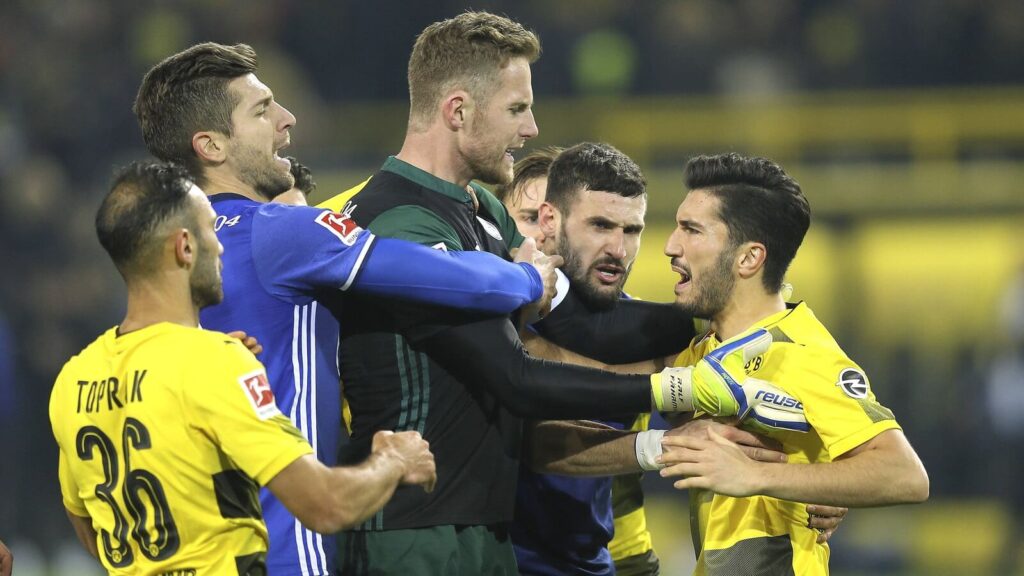The Revierderby is among a few footballing rivalries that truly harness the raw emotions, historical pride and working-class roots. Extending through Germany’s industrial Ruhr region, this rivalry is more than just a battle for points. It is somewhat an existential standoff celebrating identity, tradition and bragging rights. Over the decades, the Revierderby has held testimony to numerous moments written in German football history. While it may have lost some luster in recent years, the cultural and sporting relevance of this rivalry is firmly ingrained in German society.
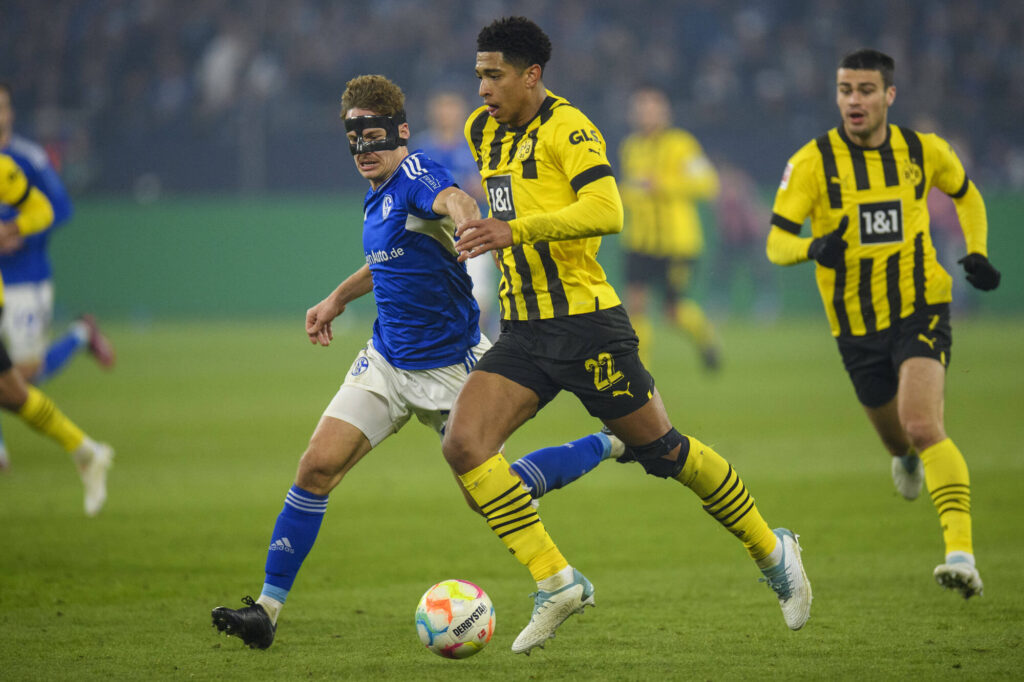
Born of the Mines
The Revierderby, named after the Ruhr area (Revier), can trace its origins to the 1920s when these two clubs first met. Schalke, founded in 1904, completely dominated German football during the 1930s and 1940s. Their revolutionary free-flowing, short-passing style known as “Schalker Kreisel” brought them numerous national championships and changed the footballing zeitgeist.
Dortmund, founded in 1909, tasted success a little later. The early meetings were heavily one-sided in favor of Schalke – by 1943, the reigning champions had won 14 of the first 16 encounters. This early dominance gave a sense of underdog defiance among Dortmund fans that even today festers as rivalry.
Both clubs evolved with the cities after the Second World War. Dortmund and much of its coal and steel economy became a breeding ground for passionate, working-class fan bases. While Gelsenkirchen, home to Schalke, had grown through mining culture.
The Clash of Cultures and Cities
Physically only 30 kilometers apart, the chasm between Dortmund and Gelsenkirchen is deep. These are both industrial towns, but with different football philosophies. The Schalke fan will swear by grit and loyalty and the Dortmunder will proclaim aggression mixed with love for youth.
More than geography separates these two clubs and their respective ultras. It is an emotionally charged, almost tribal engagement. Families are usually split by allegiance as derbies never lacked for hooliganism in pubs, tense office rivalries and even stadium bans for away fans during heated times.
Although neighbors, there is little love lost. Chants, banners and graffiti bear witness to a storied animosity. The Dortmund fans chant; “Blue and white like the sky? Nah, sadness!” The reply from Schalke is just as vitriolic.
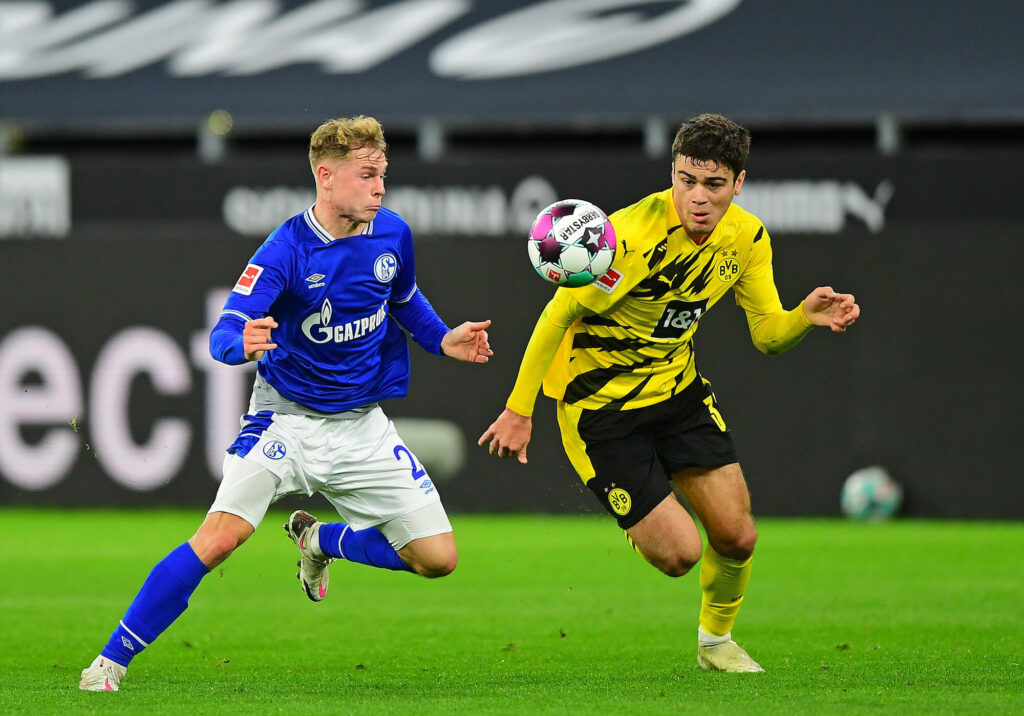
Legendary Matches That Defined the Derby
The Revierderby has produced countless moments of drama. A few iconic matchups stand out:
1. Dortmund 4-4 Schalke (2017)
Perhaps the most jaw-dropping derby in recent memory. Dortmund stormed to a 4-0 lead in the first half, only for Schalke to mount a historic comeback and level the match in the dying moments. The 94th-minute header from Naldo sealed a game that still haunts the Yellow Wall.
2. Schalke 0-2 Dortmund (2007)
This victory helped Dortmund prevent Schalke from winning the Bundesliga title. Dortmund fans remember it as the day they became the “Meisterschreck” (championship spoilsport). Schalke fans were left heartbroken yet again.
3. Schalke 2-1 Dortmund (2005)
A heated battle where Schalke came out on top. Goals from Lincoln and Aílton sealed a vital derby win. It was sweet revenge for Schalke fans during a tense Bundesliga campaign.
4. Dortmund 3-0 Schalke (2010)
During Dortmund’s rise under Jürgen Klopp, this dominant victory sent a strong message. Shinji Kagawa scored twice, becoming an instant fan hero, and the Yellow Wall roared as Schalke were swept aside.
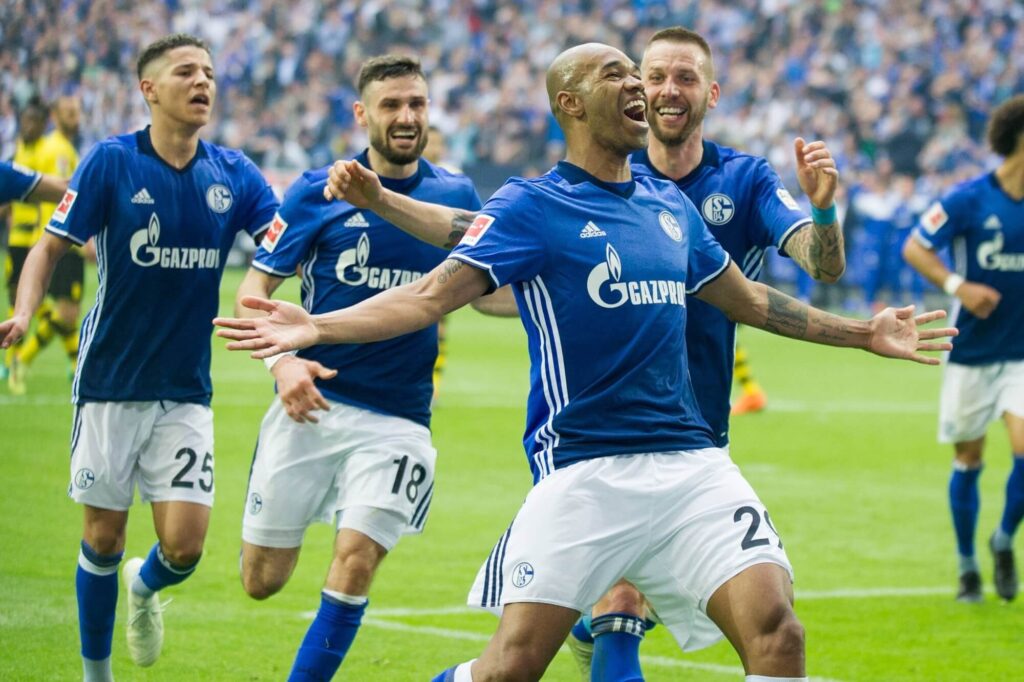
Players Who Lit Up the Revierderby
A historic clash where players performed when the chips were down:
Shinji Kagawa – A Japanese playmaker who lit up the Revierderby in the Klopp era, famously scoring a brace in a 3–1 Dortmund win in 2010. His technical brilliance made him a derby hero.
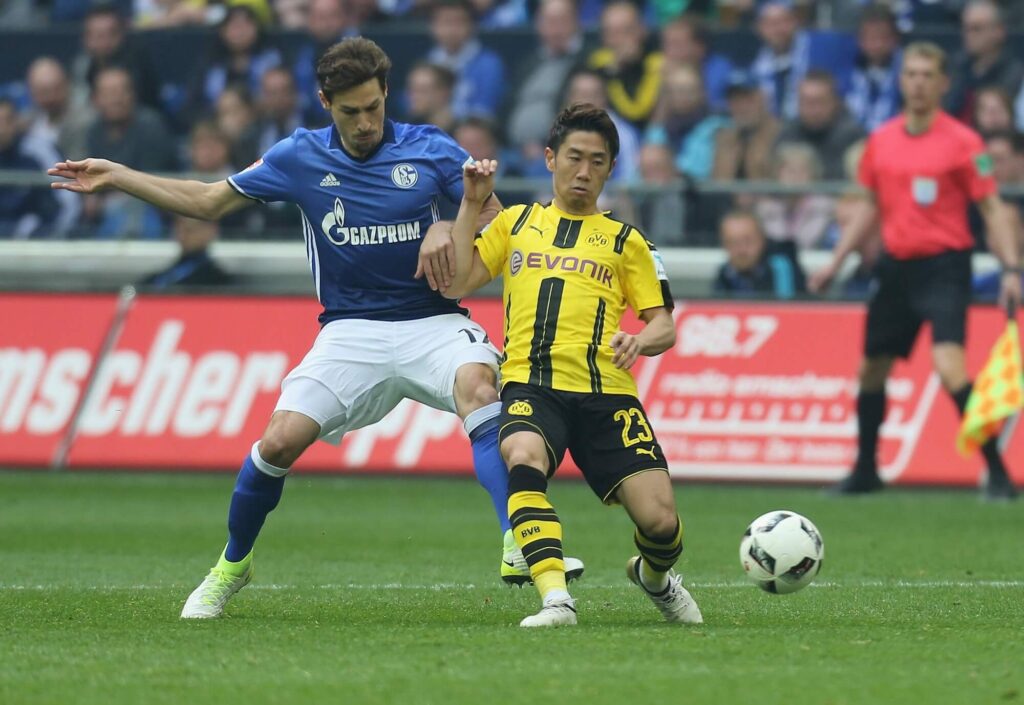
Gerald Asamoah – The energetic talisman of Schalke whose defense was constantly troubled by his exploits against Dortmund in the 2000s.
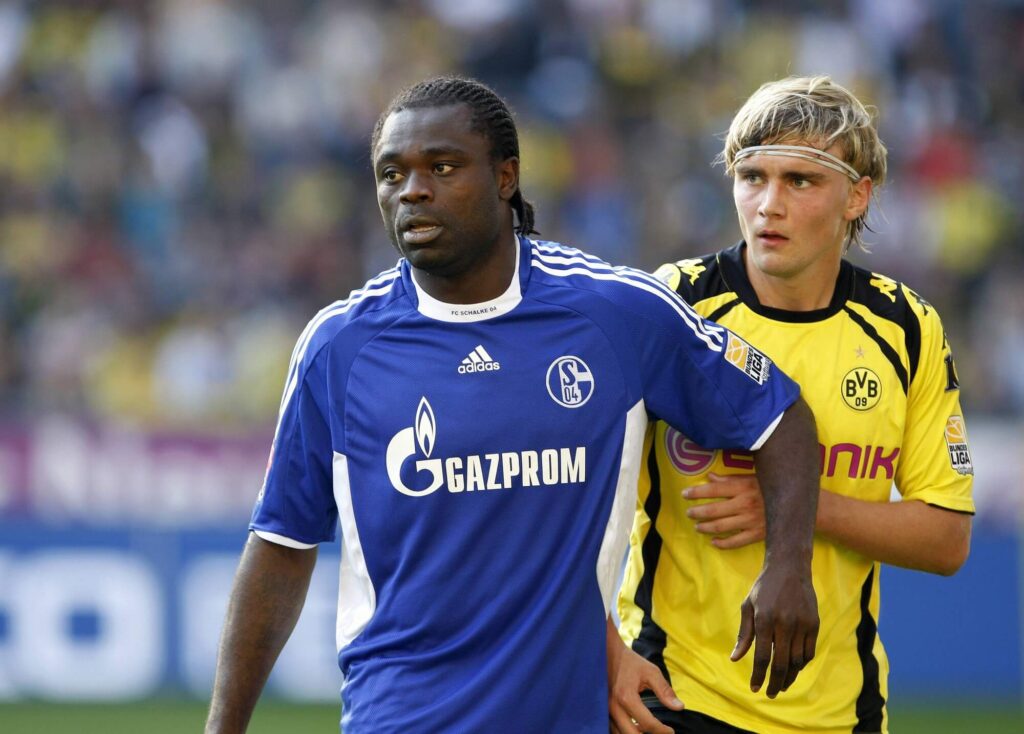
Marco Reus – A Dortmund native who has often stamped his authority with goals, assists, and leadership on derby day.
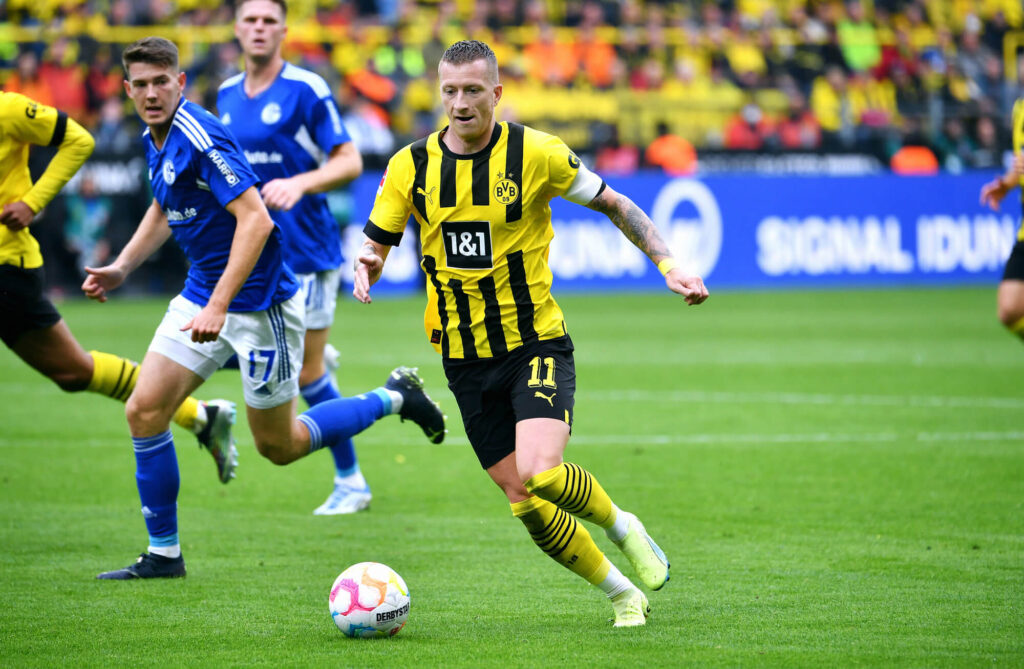
Naldo – The towering Schalke center-back whose dramatic 94th-minute header completed the legendary 4–4 comeback in 2017, instantly writing himself into derby folklore.
Andreas Möller – He was one of the few who played between both sides and provoked the other side with exaggerated celebrations.
Decline in Derby Popularity: What Went Wrong?
The Revierderby has been famous for years, but over the decades it lost some of the sparks. That is a combination of objects of structural as well as situation.
Schalke’s Relegation in 2021: The derby was put on hold as Schalke fell into the 2.Bundesliga following the disastrous season. Without hosting derby matches on a regular basis, the tension faded from fans that missed the buildup, the hostile atmosphere and the high-stakes drama.
Diverging Fortunes: Champions League and title challenges have been the names of the games for Borussia Dortmund while Schalke did not make headlines for financial distress followed by managerial incompetence and poor performances. All of this has made the recent contests between the two teams a lot more predictable and even less exciting.
Other Rivalries Have Grown: Rivalries tend to rekindle as the changing landscape of the Bundesliga allows itself to favor contests like Dortmund vs. Bayern (Der Klassiker). This left many others in relative obscurity due to TV rights, sponsorships and audiences.
Fan Restrictions: The damage has already been done by the pandemic since most die-hard supporters of events got affected. The famed Yellow Wall and Schalke’s Nordkurve were silenced. The hollow atmosphere in the derby also suffers from not having a full stadium of fans.
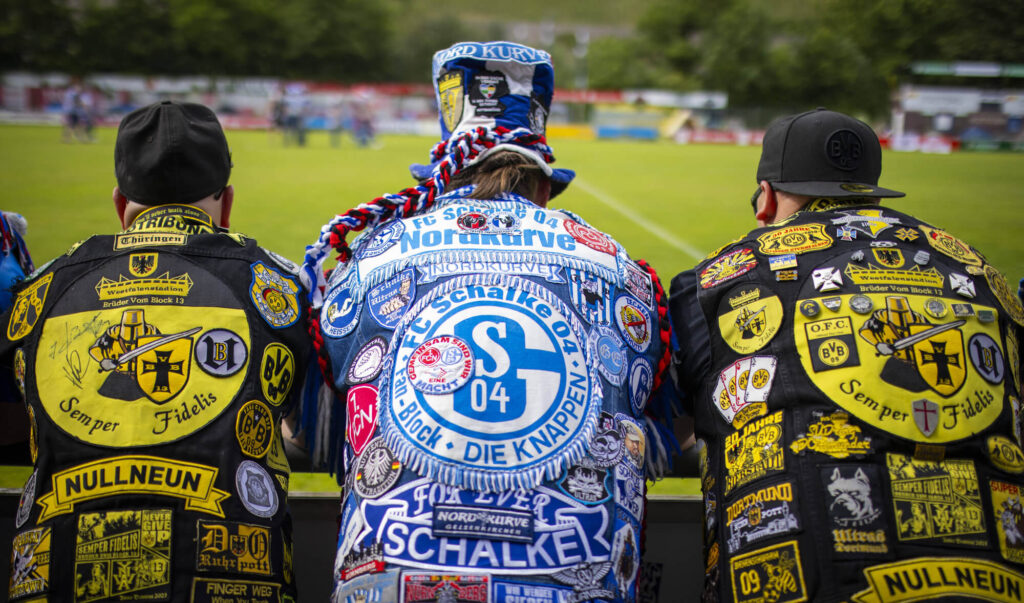
What the Future Holds
With Schalke once more being relegated and Dortmund being title-chasers, the gulf remains. Yet German football can pride itself on tradition, and very few traditions are as revered as that of the Revierderby.
Both youth academies produce talent even today. The fan culture is still alive. Supporters claim that once the fixtures are announced, they circle Revierderby dates in red, irrespective of the teams’ positions on the league table. The derby matters, always.
Stability and a long-term vision are what Schalke needs to bring itself back into the global limelight. Bundesliga also enjoys these two giants at their bitterest.
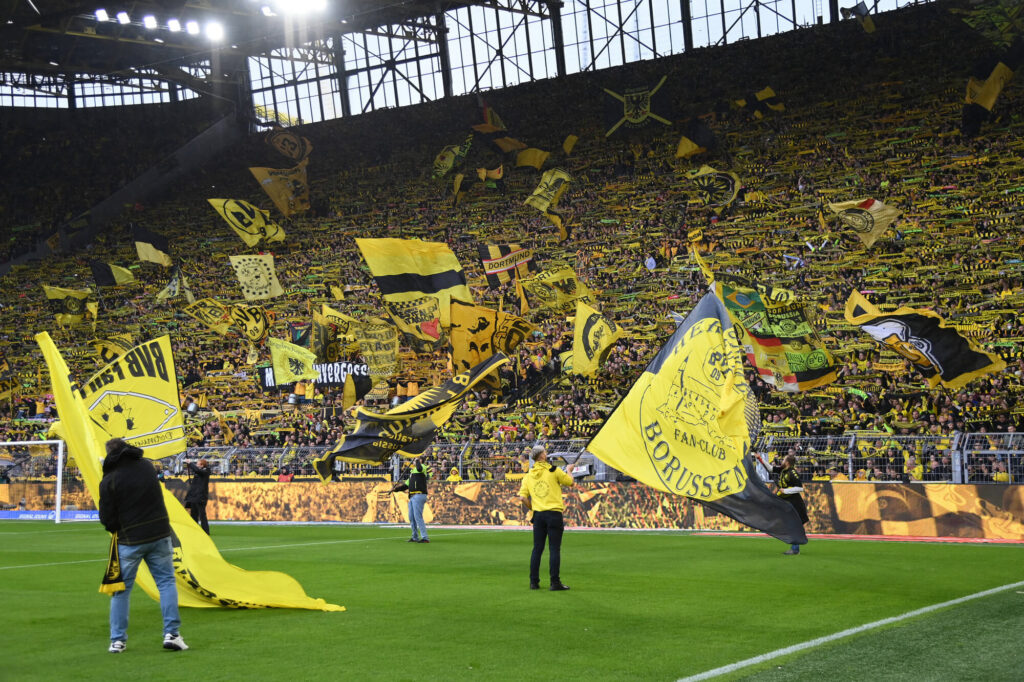
Why the Revierderby Still Matters
The Revierderby is not just any football match. It is a socio-cultural mirror for the spirit, significance and deep pride of the Ruhr valley. A tradition passed down from father to son – for lifelong feuds and cherished memories shared.
It has seen the rise and fall of legends, giants and footballing catharsis of emotions like no other. While the world shifts its gaze towards more glitzy rivalries, the Revierderby still stands as Germany’s most honest, most raw footballing spectacle.
The Revierderby tells us football is much more than silverware and front-page news. It’s about hometown pride, historical traumas and the ever-tumultuous relationship between two cities – independent yet so intertwined. Be it in the summit or the trough, Dortmund – Schalke has always been one of the amazing rivalries in football.
